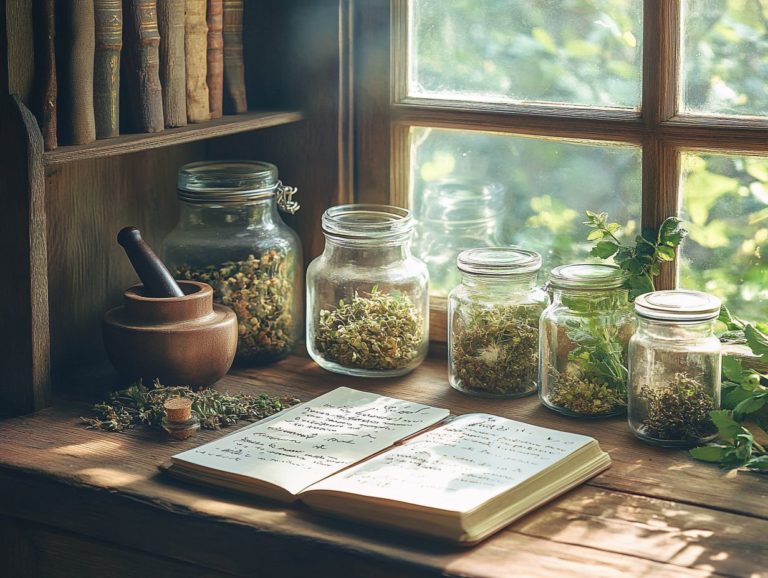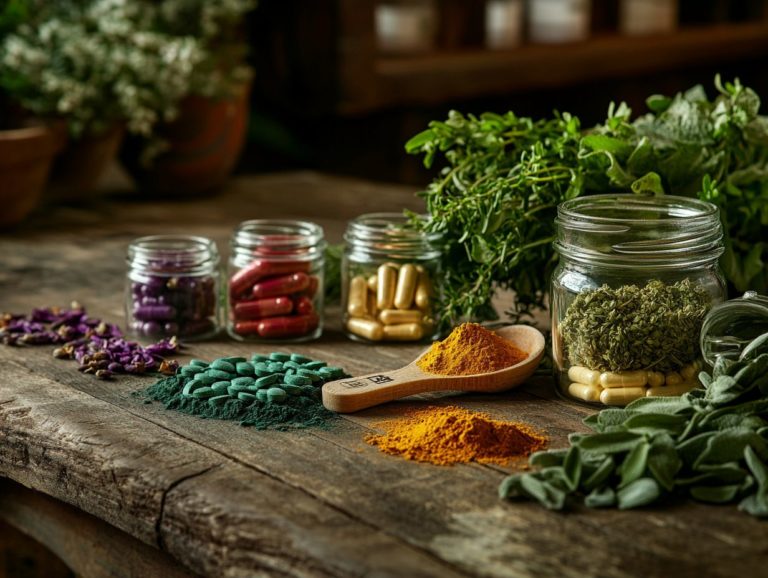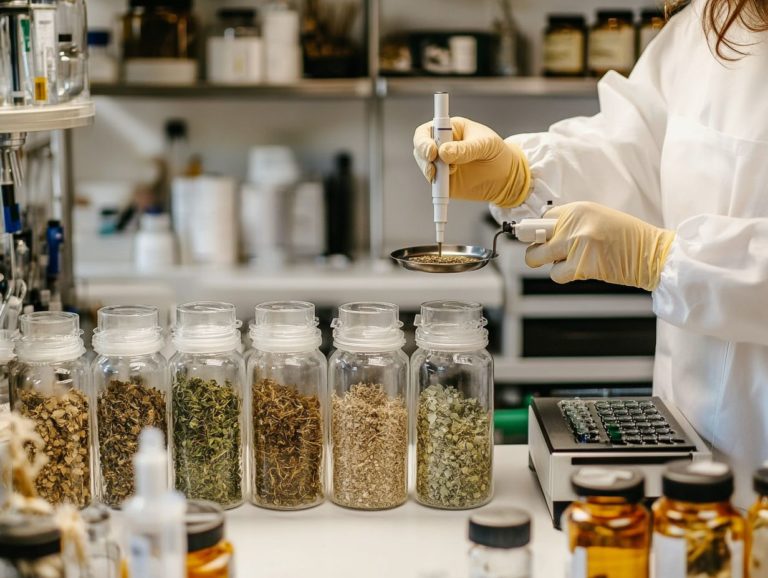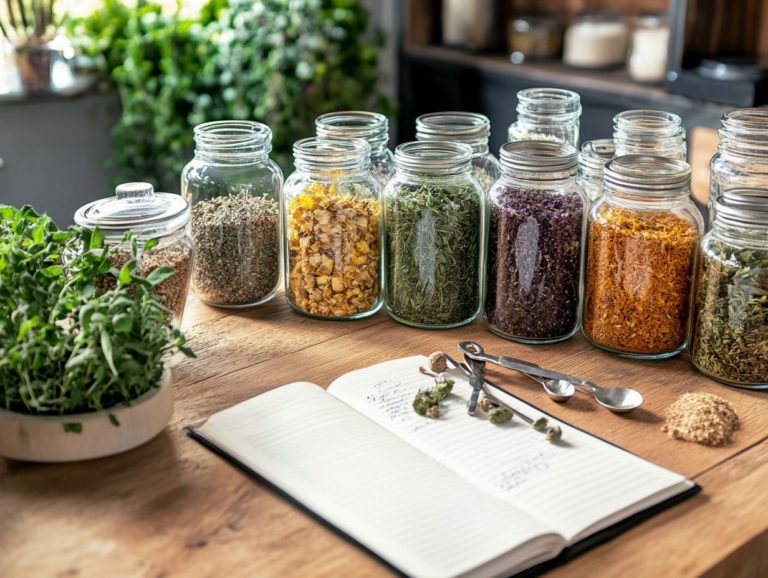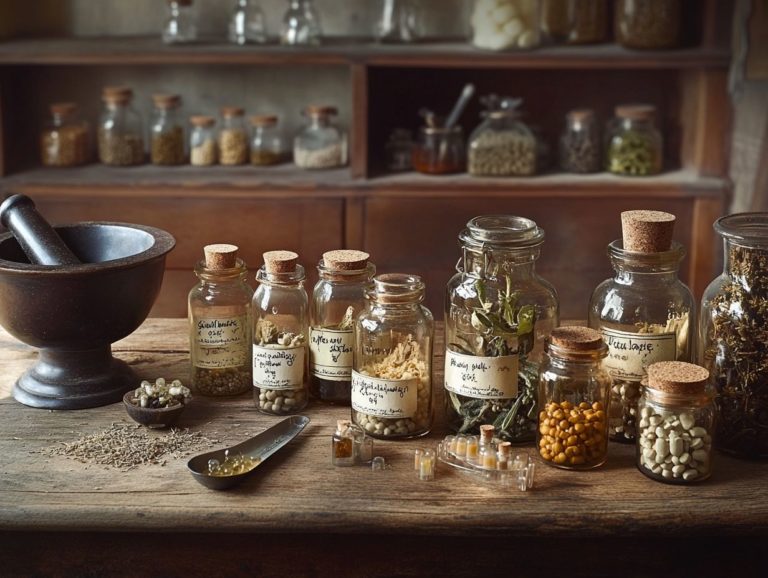5 Essential Tips for Safe Herbal Use
Herbs have been a cornerstone of natural health for centuries, providing benefits that range from boosting immunity to enhancing mood through various herbal medicines.
As you venture into the world of herbal remedies, it s essential to approach it with cautionary advice and knowledge.
This article offers five crucial tips to ensure your herbal journey is safe and effective. From understanding the importance of thorough research and proper dosing to recognizing potential herbal interactions with medications, you ll be guided through the best practices for incorporating herbs into your daily routine.
Explore how to harness nature s gifts responsibly through herbal preparations and elevate your wellness journey!
Contents
- Key Takeaways:
- 1. Research: Your First Step to Safe Herbal Use!
- 2. Start with Small Doses
- 3. Be Aware of Potential Interactions with Medications
- 4. Always Consult with a Healthcare Professional
- 5. Pay Attention to Your Body’s Reactions
- What Are the Potential Risks of Herbal Use?
- How Can One Determine the Quality and Safety of Herbal Products?
- What Are the Most Commonly Used Herbs and Their Potential Benefits and Risks?
- How Can You Safely Incorporate Herbal Medicine into Your Daily Routine?
- What Are the Best Practices for Storing and Using Herbs?
- What Are Some Alternative Methods for Using Herbs Safely?
- Frequently Asked Questions
- Why is it important to research and understand the herb before use?
- What type of healthcare professional should I consult before using herbs?
- Why should I start with small doses and slowly increase when using herbs?
- How can potential interactions with medications be avoided when using herbs?
- What should I do if I experience negative side effects from using herbs?
Key Takeaways:
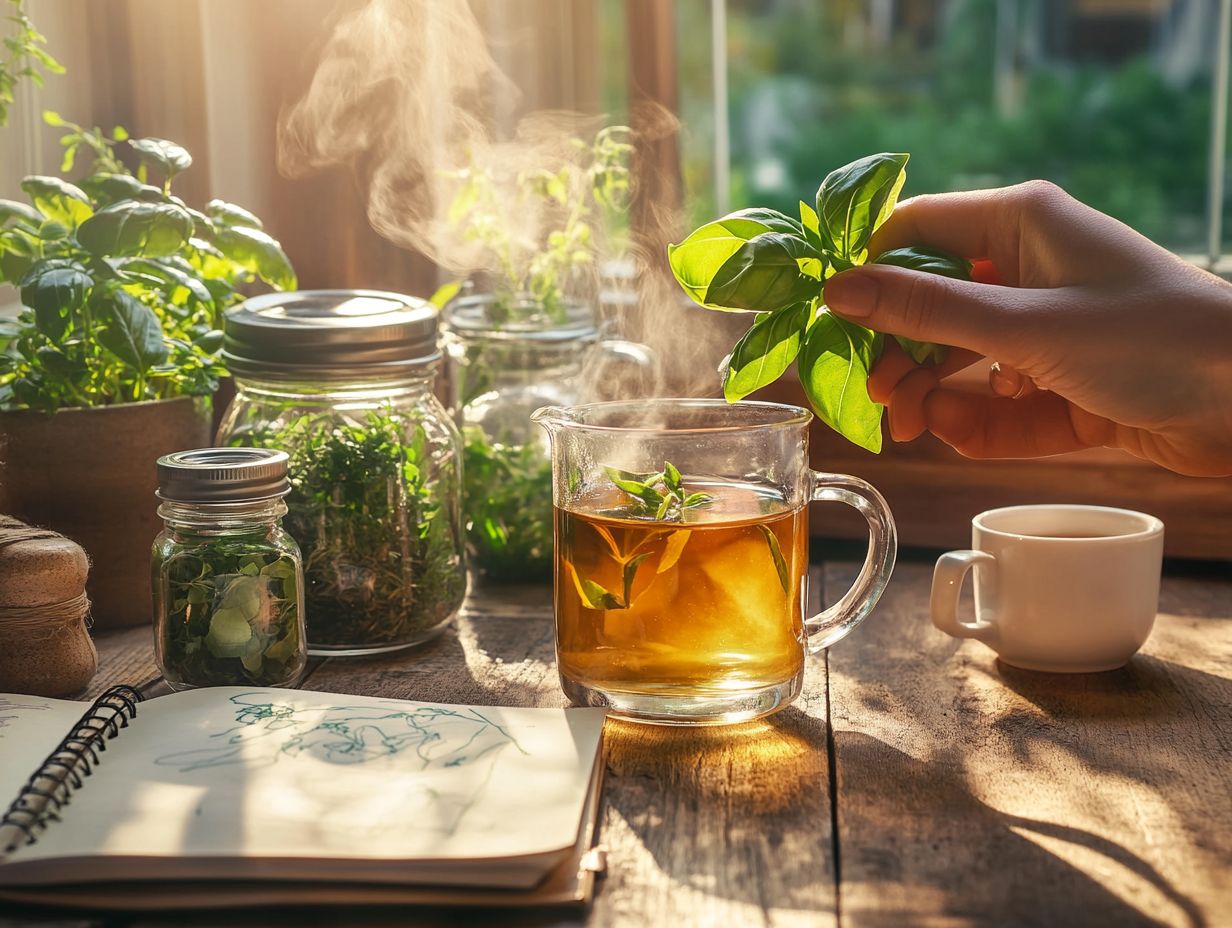
Research new herbs thoroughly to ensure safety and benefits.
Begin with small doses to see how your body reacts.
Consult a health professional about potential interactions with medications.
1. Research: Your First Step to Safe Herbal Use!
Before incorporating new herbs into your health regimen, take the time to dive deep into your herb choices! You ll want to understand their medicinal properties, potential health benefits, and any health concerns that could arise from using them in herbal medicine or as dietary supplements, including long-term health issues that may affect their efficacy.
This understanding is vital when considering the diverse range of plant sources and traditional folk medicines, each with its unique history and traditional applications. Many cultures have relied on specific herbs for generations, passing down invaluable knowledge about their effects and uses.
Modern research studies play a pivotal role in validating these traditional uses. They provide a scientific foundation that helps establish quality standards and safety precautions for effective use of herbal therapy. Health practitioners are essential in guiding you through this landscape, ensuring you make informed choices and consider dosing recommendations based on reliable data and your personalized health needs.
2. Start with Small Doses
When exploring new herbal remedies, it s vital to start with small doses. This approach allows you to monitor your body’s response while minimizing the risk of side effects and ensuring effective immune support and potential anxiety relief through careful selection of natural products.
If you don t notice any adverse effects, you can boost your results by gradually increasing your intake. This method lets you tailor your approach to meet your individual needs.
Herbal supplements come in various forms, each with its unique properties and effects. It s important to exercise caution, as some may contain high concentrations that could lead to negative health outcomes.
Being aware of the specific herbal remedy and its recommended dosage can significantly reduce the risks associated with herbal supplements. For additional guidance, consider creating herbal remedies: safety tips, paving the way for a safer and more effective experience overall.
3. Be Aware of Potential Interactions with Medications
Understanding the potential interactions between herbal remedies and medications is crucial. Certain herbs can impact the effectiveness of your prescription medications and lead to unexpected drug interactions.
This is why seeking guidance from health professionals be it a medical doctor or a qualified herbal medicine practitioner is essential. They can perform a comprehensive evaluation of your unique health situation and provide insights into the potential risks associated with herbal supplements.
Common herbs like St. John’s Wort and garlic are well-known for their ability to influence how medications are metabolized, which can either reduce the effectiveness of your treatment or heighten side effects. Therefore, exercising caution when considering the combination of these natural remedies with your prescribed medications is vital for ensuring safe and effective healthcare decisions.
4. Always Consult with a Healthcare Professional

Consulting with a healthcare professional before diving into the world of herbal medicines is essential. They provide tailored advice and ensure that safety precautions are observed.
Health practitioners educate you about the potential benefits and risks associated with various herbal medicines. They help you identify which products may best complement your specific health needs and conditions.
Organizations like the Herbalists Association offer invaluable resources for both practitioners and patients. They highlight the importance of ethical sourcing and using natural healing practices. Finding reputable suppliers is crucial, as the quality of herbal products can vary significantly.
Practitioners guide you in discerning reliable brands, ensuring that you use supplements that are both effective and safe.
5. Pay Attention to Your Body’s Reactions
Monitoring your body’s reactions to herbal remedies is essential for effective health management. This practice helps you identify side effects and understand the health benefits and medicinal uses of specific herbs.
To make this process effective, maintain a detailed journal. Document your daily experiences to capture fluctuations in mood, energy levels, and overall well-being.
Note both the positive effects, like improved vitality or reduced discomfort, and any adverse reactions, such as digestive issues or allergic responses.
This comprehensive record helps you evaluate the efficacy of various herbal supplements and fosters a deeper connection with your health. Stay attuned to these changes to make informed decisions on your wellness journey.
What Are the Potential Risks of Herbal Use?
Understand the potential risks now to stay safe with herbal use, including side effects and contraindications. This ensures safe practices when considering herbal therapy for your health concerns.
Certain herbs, like St. John s Wort and Garlic, can interact unfavorably with medications, potentially diminishing their effectiveness or increasing toxicity. Herbs such as kava and comfrey have been linked to liver damage, highlighting the need for quality assurance and adherence to established quality standards in herbal products.
Select products certified by reputable suppliers to mitigate these risks, ensuring they are free from contaminants. Consulting with a healthcare professional before starting any herbal regimen can help you navigate potential interactions and monitor for adverse effects. This ultimately paves the way for safer herbal usage, especially by exploring 5 essential herbal preparations for beginners.
How Can One Determine the Quality and Safety of Herbal Products?
Determine the quality and safety of herbal products by researching reputable suppliers and familiarizing yourself with regulatory standards set by organizations like the FDA and the Therapeutic Goods Administration.
Seek out certifications that demonstrate adherence to quality practices, such as Good Manufacturing Practices (GMP), ensuring the safety of all herbal products. Batch testing results offer insights into product purity and potency, confirming what you are buying.
Exploring customer reviews uncovers firsthand experiences and highlights potential red flags regarding effectiveness and adverse effects of various herbal preparations. By ensuring that your herbal products come from trustworthy suppliers, you can significantly mitigate risks related to safety and efficacy, promoting better health outcomes and peace of mind.
Start your health journey today by consulting a professional!
What Are the Most Commonly Used Herbs and Their Potential Benefits and Risks?
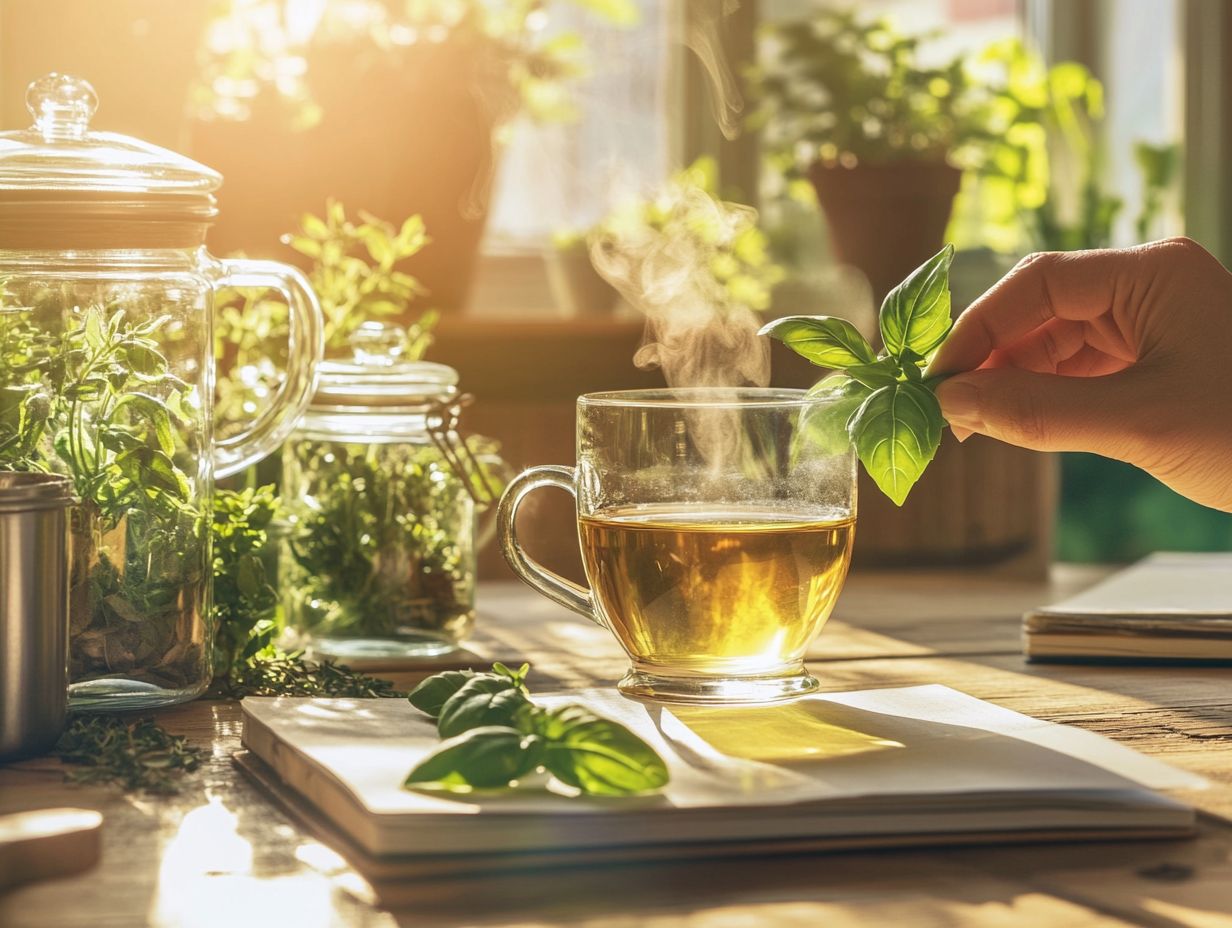
Familiarizing yourself with herbs like Echinacea, Ginkgo biloba, and St. John s Wort helps you understand their health benefits and risks. This knowledge empowers you to make informed decisions about herbal remedies.
Consider herbs like Turmeric, known for its anti-inflammatory effects. Garlic is also beneficial for heart health and blood pressure regulation.
While Echinacea may boost your immune system, it can cause allergic reactions in some people.
Ginkgo biloba, praised for its cognitive benefits, also poses bleeding risks, especially when taken with medications that prevent blood clots.
St. John s Wort can help with mild to moderate depression. However, it may interact with various medications, reducing their effectiveness.
By understanding these nuances, you can incorporate these natural remedies into your daily life.
How Can You Safely Incorporate Herbal Medicine into Your Daily Routine?
To safely add herbs to your routine, know the right dosage for each herbal preparation. Ensuring they complement your dietary supplements is crucial.
Start with herbal teas for a comforting daily ritual. Herbal capsules provide convenience and precise dosing for a busy lifestyle.
As you begin, monitor how they affect your well-being. Watch for side effects and maintain consistency for the best results.
Incorporating these plant allies enriches your health journey. Remember to be patient and follow dosage recommendations for safety.
What Are the Best Practices for Storing and Using Herbs?
Properly storing herbs is vital to maintain their effectiveness and safety. Follow precautions to prevent degradation and contamination.
Store dried herbs in airtight containers away from light and moisture to preserve their flavor and potency. Use dark glass bottles for tinctures to protect them from light exposure.
For herbal oils, choose dark bottles and refrigerate them to prevent rancidity. Regularly check expiration dates to ensure your supplies are fresh and safe.
These practices are essential for any herbal enthusiast committed to quality and safety.
What Are Some Alternative Methods for Using Herbs Safely?
Exploring alternative methods for using herbs safely and their traditional uses, considering potential drug interactions can really boost how effective they are for your health. This allows you to tap into the myriad benefits of herbal remedies through various therapies and natural products.
One particularly effective approach is herbal infusions and herbal therapy. These methods gently extract beneficial properties from plants, making it easy for you to incorporate them into your daily routine. If you re looking for localized relief, poultices are worth considering. By applying a blend of herbs directly to your skin, you can foster quicker healing through targeted action.
Then there are essential oils and their medicinal use, known for their concentrated form. They can be diffused or diluted for topical use, promoting both your physical and emotional well-being.
Always keep safety in mind. Consider proper dosing and potential interactions with conventional treatments to craft a balanced and holistic health strategy that maximizes benefits while minimizing risks.
Frequently Asked Questions
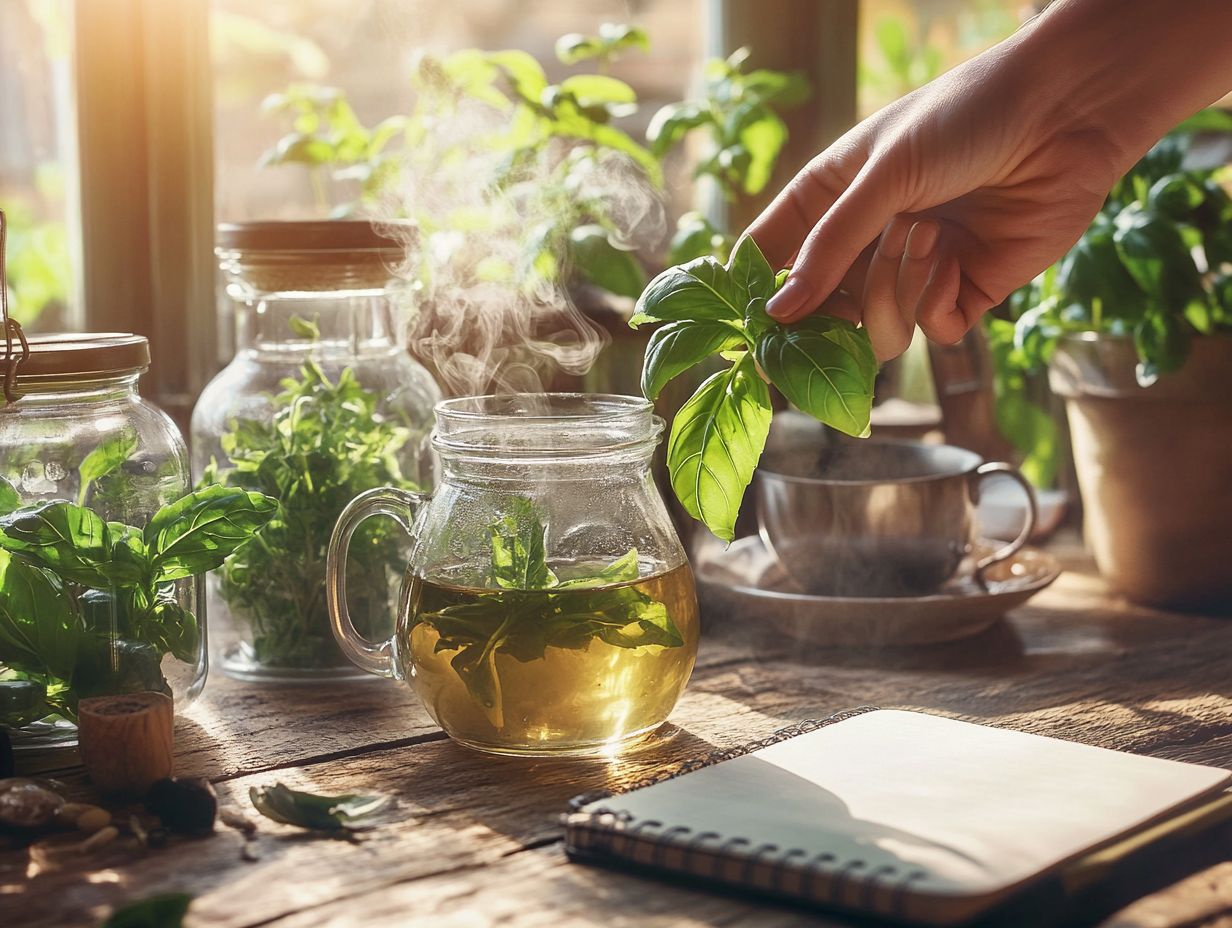
What are the 5 essential tips for safe herbal use?
- Research and understand the herb before use, particularly noting possible problems for long-term diseases.
- Consult with a healthcare professional.
- Start with small doses and slowly increase.
- Be aware of potential interactions with medications.
- Stop use if any negative side effects occur.
Why is it important to research and understand the herb before use?
Understanding how different herbs affect your body is crucial. This knowledge can help prevent any negative reactions or interactions with other medications.
What type of healthcare professional should I consult before using herbs?
It’s best to consult with a licensed healthcare professional, such as a doctor or registered herbalist. They can provide personalized advice based on your individual health and any medications you are taking.
Why should I start with small doses and slowly increase when using herbs?
Starting with small doses and gradually increasing can help your body adjust to the herb. This minimizes the risk of any adverse reactions.
How can potential interactions with medications be avoided when using herbs?
To avoid potential interactions with medications, inform your healthcare professional of all the herbs and supplements you are taking. They can help determine any potential interactions and advise on the best course of action.
What should I do if I experience negative side effects from using herbs?
If you experience any negative side effects from using herbs, stop using them immediately and consult your healthcare professional. They can help determine the cause of the side effects and provide appropriate treatment if needed.

